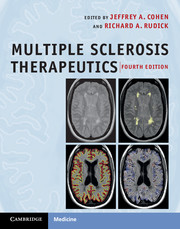Book contents
- Multiple Sclerosis Therapeutics
- Multiple Sclerosis Therapeutics
- Copyright page
- Contents
- Contributors
- Abbreviations list
- Foreword
- Preface
- Section I Introduction
- Section II Clinical trial methodology
- Section III Clinical trials of multiple sclerosis therapies
- 25 Interferon beta to treat multiple sclerosis
- 26 Glatiramer acetate to treat multiple sclerosis
- 27 Natalizumab to treat multiple sclerosis
- 28 Mitoxantrone to treat multiple sclerosis
- 29 Cladribine to treat multiple sclerosis
- 30 Fingolimod to treat multiple sclerosis
- 31 Dimethyl fumarate to treat multiple sclerosis
- 32 Alemtuzumab to treat multiple sclerosis
- 33 Daclizumab to treat multiple sclerosis
- 34 Laquinimod to treat multiple sclerosis
- Chapter 35 Teriflunomide to treat multiple sclerosis
- 36 High-dose methylprednisolone to treat multiple sclerosis
- 37 Use of immunosuppressants to treat multiple sclerosis
- 38 Intravenous immunoglobulin to treat multiple sclerosis
- 39 Plasma exchange treatment for CNS inflammatory demyelinating disease
- 40 Statins in multiple sclerosis
- 41 T-cell-based therapies for multiple sclerosis
- 42 B-cell-based therapies for multiple sclerosis
- 43 Sex hormones and other pregnancy-related factors with therapeutic potential in multiple sclerosis
- 44 Hematopoietic stem cell transplantation to treat multiple sclerosis
- 45 Mesenchymal stem cell transplantation to treat multiple sclerosis
- 46 Neuroprotection in multiple sclerosis
- 47 Combination therapy in multiple sclerosis
- 48 Dalfampridine in multiple sclerosis
- 49 Complementary and alternative treatments in multiple sclerosis
- 50 The role of chronic cerebrospinal venous insufficiency in multiple sclerosis
- Section IV Therapy in clinical practice
- Index
- Plate Section
43 - Sex hormones and other pregnancy-related factors with therapeutic potential in multiple sclerosis
from Section III - Clinical trials of multiple sclerosis therapies
Published online by Cambridge University Press: 05 December 2011
- Multiple Sclerosis Therapeutics
- Multiple Sclerosis Therapeutics
- Copyright page
- Contents
- Contributors
- Abbreviations list
- Foreword
- Preface
- Section I Introduction
- Section II Clinical trial methodology
- Section III Clinical trials of multiple sclerosis therapies
- 25 Interferon beta to treat multiple sclerosis
- 26 Glatiramer acetate to treat multiple sclerosis
- 27 Natalizumab to treat multiple sclerosis
- 28 Mitoxantrone to treat multiple sclerosis
- 29 Cladribine to treat multiple sclerosis
- 30 Fingolimod to treat multiple sclerosis
- 31 Dimethyl fumarate to treat multiple sclerosis
- 32 Alemtuzumab to treat multiple sclerosis
- 33 Daclizumab to treat multiple sclerosis
- 34 Laquinimod to treat multiple sclerosis
- Chapter 35 Teriflunomide to treat multiple sclerosis
- 36 High-dose methylprednisolone to treat multiple sclerosis
- 37 Use of immunosuppressants to treat multiple sclerosis
- 38 Intravenous immunoglobulin to treat multiple sclerosis
- 39 Plasma exchange treatment for CNS inflammatory demyelinating disease
- 40 Statins in multiple sclerosis
- 41 T-cell-based therapies for multiple sclerosis
- 42 B-cell-based therapies for multiple sclerosis
- 43 Sex hormones and other pregnancy-related factors with therapeutic potential in multiple sclerosis
- 44 Hematopoietic stem cell transplantation to treat multiple sclerosis
- 45 Mesenchymal stem cell transplantation to treat multiple sclerosis
- 46 Neuroprotection in multiple sclerosis
- 47 Combination therapy in multiple sclerosis
- 48 Dalfampridine in multiple sclerosis
- 49 Complementary and alternative treatments in multiple sclerosis
- 50 The role of chronic cerebrospinal venous insufficiency in multiple sclerosis
- Section IV Therapy in clinical practice
- Index
- Plate Section
Summary
Keywords
- Type
- Chapter
- Information
- Multiple Sclerosis Therapeutics , pp. 498 - 507Publisher: Cambridge University PressPrint publication year: 2011
- 2
- Cited by

